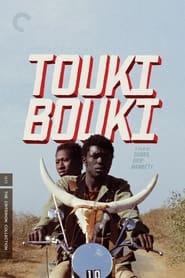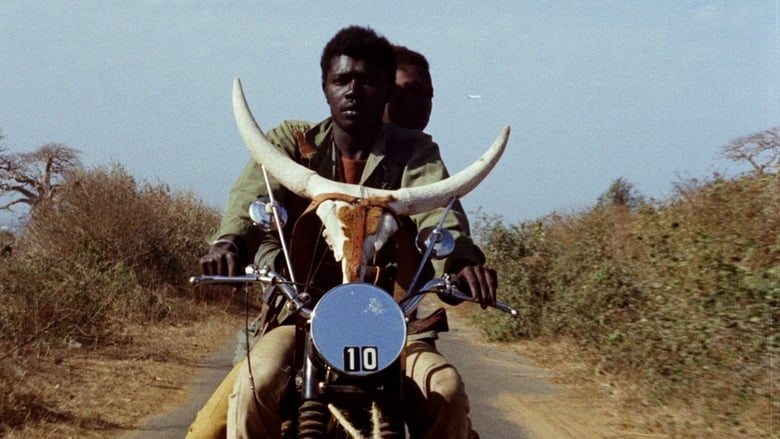“Touki Bouki” is a 1973 Senegalese film about two young lovers on a quest for money and adventure. Mory and Anta are like wild horses yearning to break free from their stifling lives. They dream of escaping to Paris, yet the harsh realities of life keep them grounded in Dakar. In their desperate attempt to flee, they rob and cheat their way to a future that may or may not exist. The film is a poetic and surreal depiction of the disillusionment felt by many young Africans during the post-colonial era.

CLICK HERE↓↓↓✅_Watch Touki Bouki 1973 English Subtitles_
Review
As I sat in the dimly lit movie theater, watching the opening scene of “Touki Bouki,” I knew I was about to embark on a journey that would take me far beyond the familiar boundaries of my own experience. This 1973 film, directed by Djibril Diop Mambéty, tells the story of Mory (Magaye Niang) and Anta (Mareme Niang), two young lovers in Dakar, Senegal who dream of escaping their mundane existence and traveling to Paris.
The story is a beautiful blend of poetic and political themes that only Maya Angelou could truly capture in her writing. The raw passion displayed by these two characters as they strive to make their dreams come true resonates with audiences even today. It is a film that refuses to be pigeonholed into one particular genre or style; rather it is an immersive experience for those who dare to explore it.
From the very first frames of “Touki Bouki,” Mambéty’s masterful direction is on full display. The camera glides effortlessly through the vibrant streets of Dakar, capturing glimpses of life and color that give the film its heartbeat. Mory and Anta are introduced as restless souls, unsatisfied with the monotony of life in Senegal. They long for something more, something grander than what their limited world can offer.
As the pair concocts a plan to leave for Paris, we see them navigate through the complications of raising funds for their journey. They rob wealthy tourists in Dakar before setting out on an epic adventure towards their dream destination. Along the way they encounter colorful characters such as a group of musicians who perform alongside them during one particularly memorable scene.
The acting in “Touki Bouki” is nothing short of extraordinary; Magaye Niang and Mareme Niang both deliver powerful performances that showcase their range as actors. They embody the essence of Mory and Anta with such authenticity that it is difficult to look away. The supporting cast is equally impressive, adding layers of depth and nuance to the film’s already rich tapestry.
While “Touki Bouki” may take place in a specific time and place, its themes resonate with viewers across cultures and generations. It is a film about the human experience, about desire and ambition, about vulnerability and perseverance. This timeless quality speaks to its enduring popularity among audiences worldwide.
The film’s soundtrack, composed by orchestra leader Ibrahima Sylla, blends traditional African music with modern jazz influences. The result is an ethereal soundscape that perfectly complements the dreamlike visuals on screen. Each note feels carefully crafted to evoke a specific emotion or mood; listening to the score alone is a transporting experience.
“Touki Bouki” was truly ahead of its time in terms of its artistic innovation and storytelling style. It remains one of Africa’s most critically acclaimed films today, having won numerous awards at international film festivals upon release decades ago. Its influence can be seen in contemporary cinema across the globe.
The film’s legacy extends beyond its artistic merits; it was also instrumental in shaping the identity of post-colonial Senegal during a time of great cultural upheaval. Its rejection of Western cultural norms and call for African self-determination made it a key piece of cultural imagery for those fighting for independence across the continent.
In many ways, “Touki Bouki” defies categorization or analysis; it simply must be experienced firsthand to fully appreciate its brilliance. From Mambéty’s visionary direction to the magnetic performances by Niang and Niang (who are not related), every element works in tandem to create an unforgettable work of art that will stay with you long after viewing.
As Maya Angelou once said,”We delight in the beauty of the butterfly, but rarely admit the changes it has gone through to achieve that beauty.” This sentiment perfectly encapsulates the transformative power of “Touki Bouki,” a film that takes its viewers on a journey of self-discovery and revelation. It is a modern masterpiece, deserving of all the accolades and acclaim it has received over the years.
Technical Data

- Runtime : 91
- Release : 1973-07-01
- Genre : Drama, Romance
- Cast : Magaye Niang as Mory, Myriam Niang as Anta (as Mareme Niang), Christoph Colomb, Mustapha Ture, Aminata Fall as Aunt Oumy
- Crew : Djibril Diop Mambéty as Director, Djibril Diop Mambéty as Writer, Aziz Diop Mambéty as Costume Design, Aziz Diop Mambéty as Set Decoration, Aziz Diop Mambéty as Still Photographer
- Popularity 5.911
- Budget : 0
- Revenue : 0
- Company : Studio Kankourama, Cinegrit
- Summary : A cowherd with a skull-mounted motorcycle and a university student meet in Dakar; put off by life in Senegal, they plan to make money in Paris.
- Tagline : The Journey of the Hyena
